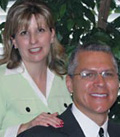 >>Working Together in Ministry
>>Working Together in Ministry
Staff and Volunteers Share Their Views
Whether paid staff or volunteer, we all face challenges when we serve god in supportive ministry roles, yet teamwork is essential to effective ministry.
 Be Adaptable
Be Adaptable
David Finley has pioneered and pastored a church, volunteered for years, and is now a paid staff member for Pastor Pat Butcher (’84, ’85) at Family Worship Center in Carrollton, Kentucky. Dave’s advice for being heard by leadership and maximizing your contribution: learn the ropes, adapt, and be patient.
The biggest surprise to me when I first became a staff member was that nobody ever thought I had a good idea,” laughs Dave. “When I suggested something, they would listen politely and then just move on!
“The quality of a staff member’s contribution will increase as he or she matures in the position,” he adds. “When you’ve just come into an organization and you’re trying to impress people with what you used to do at your old church, that doesn’t usually cut it.”
Dave uses his 30-year stint as an employee of Ford Motor Company as an example. “A lot of people came to work at Ford from other corporations, but they didn’t thrive because they couldn’t adapt to the way Ford did things. And they weren’t going to change the way Ford did things! No, the guys who became successful and had good careers with good contributions were the ones who adapted to the way Ford operated.”
He adds, “Church staff members need to step back and look at how the organization functions. They should examine how their leaders and peers operate. They should consider what’s being asked of them and how it’s supposed to be brought to the table. Then they need to adapt.”
Tips For Helpers
• Do a great job. “A common mistake helps ministers make is not following through to the very end of an assignment,” says David. “They do a good job, but they don’t get to the point where they do a great job. Ninety percent of a great job comes right at the end. It takes 100 percent effort to do a great job, but not a lot of people are willing to do that.”
Connections says—
Be an observer first. It takes a while to learn how a place works. When you first start to help in a church, take time to learn how things are done, how people interact with one another, and how you can best contribute in the existing dynamic. Avoid talking about how you used to do it where you came from—that rarely works in your favor.
Don’t get your feelings hurt. When you offer an idea, remember that once it’s heard, it may either be implemented or shelved. If an idea is shelved, don’t let it hinder you from making other suggestions in the future. Always remain a team player.
 Volunteer Because It Pleases God
Volunteer Because It Pleases God
A good attitude is essential to good service. The example of faithful service set by Bernard and Katrina is infectious. They have been members of RHEMA Bible Church in Broken Arrow, Oklahoma, since 1999, and their current volunteer duties include the hospital care team, children’s ministry, and the meal preparation committee.
We volunteer at church for several reasons,” says Bernard. “We know that the more we become involved, the more our church can do to reach people and become more effective as a church body.”
“What we like most about volunteering,” says Katrina, “is the gratification of being a blessing to someone and seeing God move through us to touch someone else. We love seeing someone smile or cry for joy because we’ve made their day either by our words or our deeds. We also like the fact that what we are doing pleases our Father God, because we want to make Him smile!
“The challenging part about volunteering,” she adds, “is balancing family responsibilities with the desire to do more in the church. That’s why it’s so important for everyone in the church to get involved. When more people are on the team, it makes it easier for everyone else on the team.” •
Tips For Volunteers
• Remember, the work doesn’t all rest on you. “It’s hard to say no when my schedule doesn’t permit me to volunteer,” says Katrina. “But I remind myself that there are other people on the team who can help, and it’s not all up to me. Serving is a team effort!”
Connections says—
Consider your family’s needs. It’s important to keep family priorities in line when volunteering, especially if you have small children. Be sure your spouse and children are in agreement with your volunteer work. There are others who can volunteer at church, but there’s no one else who can be the mom or dad at your house.
• The right motives will help you avoid burnout. The Hubbards say, “Do what you do as service unto the Lord, not unto people. When you do it for God, it’s from your heart. When you do it for people, you will burn out quickly. Do it for God with a sincere heart, for your reward comes from your Heavenly Father!”
 Ministry is About Serving
Ministry is About Serving
Bob has a two-sided perspective on pastors and helps ministers, having served as both a senior pastor and as a staff minister in different churches. Currently, he is serving as the Executive Pastor at Cornerstone Church in Nashville, Tennessee, along with 13 other associate pastors. Bob’s advice: Don’t lose sight of the fact that ministry is not always about preaching, and it’s not always convenient. It’s about serving people.
I’ve worked on both sides of the table,” says Bob, “and I’ve seen many ministers who believe ministry is about preaching rather than about people. Forgetting the ability to serve—and developing the desire to be served—hinders the move of God in many ministries. A minister is effective because of his ability to serve.
“Probably the greatest surprise I’ve found in staff ministry is that your life is not your own,” Bob adds. “My heart lives to care, love, and minister to people, and ministry is often required at inconvenient times. Deaths, crisis counseling, and emergencies are not scheduled. You deal with them when they happen.
“I believe Rev. Kenneth Hagin Jr. said it best: ‘Ministry is spelled W-O-R-K!’ I’ve hired fi ve pastoral staff members this year, and each one has come into my office at some point and said, ‘I’ve never worked so hard in all my life—but I love it.’ Ministry at times can be lonely, trying on the family, and hard on the emotions, but if you continue in faith, prayer, and walking by the Holy Spirit, whatever you put your hand to will prosper.”
Tips For Staff Ministers
• Know what to expect. “Many times,” Bob says, “staff members expect to become buddies with the senior pastor. This misconception of staff relationships can cause trouble because of wrong expectations.”
Connections says—
Not every pastor is inclined to be a friend or mentor. Don’t expect the pastor to always fi ll the role of friend or mentor in your life. Let God add the mentors and friends of His choosing to your life. Meanwhile, always maintain a heart to serve.
• Realize you’re a steward. Bob says, “I share with my associates that they do not have a ministry. They are stewards of the pastor’s ministry. There is a fine line between stewardship and ownership. We want people to develop a sense of ministry ownership, but stewardship is understanding the vision and recognizing our place in bringing that vision to fruition.”
• Live a life of integrity. “Too often, we struggle in two primary areas: insecurity and integrity. It seems as if some have a charisma that takes them places where their character won’t keep them,” Bob says.
Connections adds—
We have two tools we can use to influence others—who we are and what we say. Your Christlike character will allow you to speak into people’s lives. Hypocrites are never taken seriously. Choose today to be a person of righteous character, no matter how others are behaving around you.
• Take care of yourself. Bob shares, “I often work 45 to 50 hours a week, but one week recently (when an important dignitary in our denomination passed away), I worked without a day off, about 85 to 90 hours. I have found that having a personal exercise program, eating right, and being disciplined in the Word allow me to minister effectively even when I may be weary.”
 Be Ready for Anything
Be Ready for Anything
Todd shares the perspective of a volunteer—one who works a full-time secular job at a bank and at the same time handles both youth and music ministry in his church. He sees a helps minister as one who helps wherever needed, not just in their assigned area of ministry. Todd has been a volunteer for four years at Rock Family Church in Eureka, Missouri, under Pastor Russell Priske (’94, ’95).
One of the most important things to remember about being in helps ministry is to be flexible,” says Todd. “Be ready for anything. I’m the youth pastor, but I can’t be surprised if my pastor comes up to me and says, ‘Hey, I need your help cleaning this, or doing that, or working on the children’s ministry outreach.’ I’m available to do whatever is needed.
“For example, when I was first asked to be the youth pastor, I was young and didn’t have much experience, and I got very excited about being youth pastor,” says Todd. “But I was surprised when my pastor added, ‘You will also be responsible for keeping the youth building clean on a weekly basis.’ Ministry responsibilities tend to be broader than we think. There’s always more to the job than you think, so be ready to do whatever needs doing.”
One way Todd maintains his ready-for-anything attitude is by remembering why he volunteers in the first place. “I often tell other volunteers and helps ministers to remember we’re here because it’s our heart’s desire to serve God,” he says. “We’re not here to serve a man. Yes, we help a man fulfill his vision, but we shouldn’t do it expecting a pat on the back. Remember that when you get frustrated or tired. It brings things into perspective and helps you keep the right mindset. I’m not here to get accolades from people but to satisfy what God has put in my heart.”
Tips For Volunteers
• Respect people’s time. “One thing I appreciate about my pastor, ” Todd says,“ is that he under stands I’m a volunteer who works a full-time job outside the church, so he doesn’t make unreasonable demands of me. I have to respect those same time constraints with my fellow volunteers.”
• Watch how you talk. Todd notes, “A common mistake helps ministers make is talking to other volunteers or church members about how they disagree with their pastor’s decisions or ideas. That causes division and undermines growth. We should support the pastor publicly even when we disagree privately.”
Connections adds—
Most disagreements do not focus on what needs to be done but on how. Realize that no one will do the same project in the same way, and differing methods can accomplish the same results. Be versatile and learn from how others approach a project.
• Appreciate your workers. “One of the main reasons people leave a job—even one that pays well—is a lack of appreciation,” says Todd. “In the church world, we work mostly with volunteers, and if those volunteers will leave their paid jobs because of a lack of appreciation, you better believe they’ll leave the church for the same reason. Volunteers are giving of their lives to help build the vision. I always want to remember to spend more time appreciating and less time demanding.”
 When You Disagree With Your Leader
When You Disagree With Your Leader
David and Debbie address the issue of what to do when you disagree with your leader’s direction or decisions. For them, it boils down to fostering a long-term mutual respect with your leader and understanding your role. David has been a ministry volunteer for nearly 20 years in three different churches, currently serving as youth minister at Living Word Family Church in Naples, Florida, for Pastor Paul Foslien (’87, ’88). Debbie is currently employed as the church’s office manager.
If my pastor issues a directive, then I have an obligation to carry it out,” says David. “That is not to say I’m always in agreement. It merely means I understand my role. If I was not asked to be part of the decision-making process, then it would be presumptuous for me to think I should offer my opinion. I’m not likely to offer my input unless directly asked.”
Debbie adds, “The worst thing you can do if you disagree with your pastor is talk to other people about it. If you’re not in agreement, it’s not your responsibility to correct him. God gave him the direction for the ministry, not you.
“Proverbs 13:3 (NKJV ) says, ‘He who guards his mouth preserves his life, but he who opens wide his lips shall have destruction.’ When you go around talking about something you disagree with, you destroy credibility and reputation, both yours and your pastor’s. If it’s something serious where the pastor needs help, only speak to those in authority who can help. But don’t go talking to a lot of people and pushing your own agenda. That causes strife and division.”
David believes there are times when it’s appropriate to talk with your leader about your concerns. “First, it’s important to know whether or not his decision is negotiable,” he says. “If not, then I submit to his will and support the cause. It’s important for subordinates to have a way to communicate thoughts and concerns, but it’s the pastor’s leadership style that will determine the extent to which dialogue occurs.”
He adds, “The path to open communication is developed through repeated, positive inter action with your pastor. That takes time. If your interaction is limited, then it’s unlikely that a healthy flow of information will be achieved.”
There are different ways to work out differences with a leader. “I have had the most success with face-to-face conversations in which the leader recognizes my expertise in an area and allows me to express my views,” says David. “But that’s only happened when the leader and I have developed mutual respect for one another.” •
More Tips
• Remember who your real leader is. “The most successful helpers base their identity in Christ,” says David. “They serve as unto the Lord. When disagreements arise in ministry, they have an inner peace. They are neither striving to be recognized nor seeking their own glory. They know that God is well able to manage His kingdom.”
• Ask the tough questions in advance. David notes, “Sometimes, helpers start enthusiastically but then burn out because they never went through the process of counting the cost. Before you start helping in any ministry capacity, ask yourself: What does the position entail? How many hours of my time are needed? Can I fit this into my schedule without neglecting other areas of my life? How will this affect my family? Don’t get overextended. Don’t get involved in every available ministry opportunity, because after a while, the workload becomes too much to bear, and you quit altogether.”
 Learn Good Communication
Learn Good Communication
Steve and his wife, Jennifer, are missionaries to Zambia and have served under Rev. Walker and Haley Schurz (’90, ’91) for four years at Miracle Life Family Church in Lusaka, Zambia. Steve is associate pastor, overseeing several departments including altar care, street kids ministry, and healing teams. As you read Steve’s comments, ask yourself, “Am I doing my part to communicate with my pastor, peers, and those under me?”
In communicating with pastors, it’s always good to be prepared beforehand,” says Steve. “The corporate world uses the ‘times-10 rule,’ meaning you should spend at least 10 minutes preparing on any issue that takes one minute of your boss’s time. Preparation makes your presentation clearer.
“Once you’re actually communicating, stay focused,” he adds. “Ask for clarification if you have any doubt about what’s being said. Deadlines should be confirmed a second time.
“The best method of communication depends totally on your pastor,” says Steve. “Communicate with him in the way he prefers. Some issues require a face-to-face meeting, but many things do not. Notes, e-mails, and phone calls are great for most day-to-day issues.”
Steve also says, “Honor is a big issue. Honor your pastor’s time. If he wants details, by all means give them. If he doesn’t, then summarize the matter and offer your thoughts. Adapt to the way he likes to receive information.”
Steve also has a suggestion for those who feel they don’t have good communication with their leader: “Keep working to build trust. Listen to what your pastor says, both in private and in the pulpit. Understanding opens the door for communication. If you don’t know your leader’s preferred way to communicate, then explore with e-mails, memos, calls, short visits, or intense meetings. And always use a variety.
“Many times, lack of communication is not a lack of heart; it is a lack of connection,” he adds. “Poor communication doesn’t disqualify the leader or devalue the server. Communication can always be made better, but never without effort. Be alert, be prepared, and walk in love. You will find the connection.”
Tips For Staff Members
• Communicate with those under you. Steve says, “People’s questions may not always seem important to you, but give them the dignity of your attention, and if possible, don’t rush them. If you have to end a meeting with your workers, be tactful. Make it a habit to thank them for their input and concern. Also, written communication such as e-mails or memos are good for conveying details, but not for correction. If you have to correct or confront someone, do it in person.”
Connections says—
Get both sides. Be sure to get all the facts; there are always two sides to every story. Be careful that the first person who speaks to you doesn’t have the greatest impact on how you view the situation. Withhold your opinion until you are able to hear from everyone involved. This will help you avoid misunderstandings and premature conclusions.
• Understand your position. “Many staff members misunderstand the pressure their pastors endure,” Steve says. “It’s easy to think that you would love the top spot and that you know what it’s like, but you probably don’t. The opportunity we have to serve is from God; if we forget that, we will not give our service a worthy effort.”
• Enjoy today. “Today is the only time you can laugh, contribute, and grow. Do these things well today and you will be ready tomorrow.”
Connections says—
Enjoy the journey. You can be effective in ministry and at the same time nurture and enjoy your marriage, children, and friends. Make time to relax, have fun, and build your relationships. Happy, balanced marriages and families will add strength and energy to your ministry.
Timing is everything. When communicating with your pastor, especially about a sensitive issue, be sure you pick the right time to bring it up. It’s not usually a good idea to initiate important conversations in the church hallways, before or after the service, or during times designated for relaxation or fellowship.



